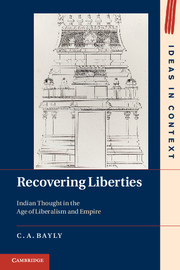Book contents
- Frontmatter
- Contents
- Preface
- Note on Indian names
- Introduction
- Chapter 1 The social and intellectual contexts of early Indian liberalism, c.1780–1840
- Chapter 2 The advent of liberalism in India
- Chapter 3 The advent of liberal thought in India and beyond
- Chapter 4 After Rammohan
- Chapter 5 Living as liberals
- Chapter 6 Thinking as liberals
- Chapter 7 Giants with feet of clay
- Chapter 8 Liberals in the Desh
- Chapter 9 ‘Communitarianism’
- Chapter 10 Inter-war
- Chapter 11 Anti-liberalism, ‘counter-liberalism’ and liberalism’s survival, 1920–1950
- Conclusion
- Glossary
- Select bibliography
- Index
- References
Chapter 7 - Giants with feet of clay
Asian critics and Victorian sages to 1914
Published online by Cambridge University Press: 05 June 2012
- Frontmatter
- Contents
- Preface
- Note on Indian names
- Introduction
- Chapter 1 The social and intellectual contexts of early Indian liberalism, c.1780–1840
- Chapter 2 The advent of liberalism in India
- Chapter 3 The advent of liberal thought in India and beyond
- Chapter 4 After Rammohan
- Chapter 5 Living as liberals
- Chapter 6 Thinking as liberals
- Chapter 7 Giants with feet of clay
- Chapter 8 Liberals in the Desh
- Chapter 9 ‘Communitarianism’
- Chapter 10 Inter-war
- Chapter 11 Anti-liberalism, ‘counter-liberalism’ and liberalism’s survival, 1920–1950
- Conclusion
- Glossary
- Select bibliography
- Index
- References
Summary
This chapter considers further how Indian and other Asian public men responded to, refuted and re-cast the arguments of the leading intellectuals of late nineteenth-century Britain – writers such as Mill, Stephen, Spencer, Darwin and Maine. It shows how Indians applied benign sociology and statistical liberalism formally to challenge their theoretical statements. In these debates Indians were at a great disadvantage politically and geographically. There was no real ‘dialogue’. Only a few, such as Malabari, Naoroji and Keshub Chunder Sen, could actually visit the British and European arenas in which these debates took place. They received copies of newspapers and journals months after literary exchanges had occurred in London and without direct knowledge of the metropolitan social contexts to which they were addressed. Not many of them knew French or German, though their British contemporaries were in almost constant debate with writers of these nationalities. Major European intellectuals rarely deigned to respond to Indian critiques and arguments, content to view Indian thought as a dead tradition.
Yet Indian public men adjusted their exchanges with these British writers to their own indigenous audiences and to their Anglo-Indian critics. They were stamping their authority on Indian debates, often with an eye to vernacular translation and dissemination, rather than expecting a productive intellectual encounter with the distant and aloof European writers. The arguments in contention ranged across political economy, sociology and religion, but for Indians there were distinct underlying connections between these domains of knowledge. As we have seen, it is striking how many of the Indian statistical liberals and political economists were also expounders of classical Indian religious texts. Victorian thinkers, both British and Indian, were ‘public moralists’, to use Stefan Collini’s phrase, rather than economists or social scientists. The doctrines of political economy and social Darwinism were for them moral imperatives as well as social sciences, even if God had ‘taken a back seat’. John Bowring, Bentham’s follower, had once asserted opaquely that Jesus ‘was’ free-trade and the providentialist dimension of nineteenth-century British thought about famine and economic cycles is well known. Spencer’s concern with the rise and degeneration of organisms was infused with moralising imagery. Even agnostic British Victorians believed that ‘by their works, shall ye know them’. Similarly, for Indian public men, understanding and celebrating Hindu civilisation’s great works of the past – moral, social and economic – were a vital guarantee of its present improvement and great future.
- Type
- Chapter
- Information
- Recovering LibertiesIndian Thought in the Age of Liberalism and Empire, pp. 188 - 213Publisher: Cambridge University PressPrint publication year: 2011
References
- 1
- Cited by

